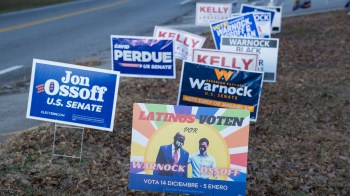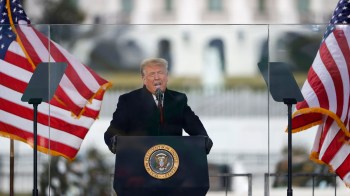Cheap borrowing may not last in 2010
TEXT OF STORY
Kai Ryssdal: One other big way the economy now is different than the economy 10 years ago is that we owe way more money. On the order of trillions of dollars. To pay its bills, bailouts and military and otherwise, the government’s selling more and more IOUs. This year the Treasury Department sold just over $2 trillion worth of debt — T-bills and notes and bonds. Best guesses are they’re going to have to sell even more in 2010. With interest rates down near zero it was cheap for Uncle Sam to borrow all that money this year. And there were willing buyers. Next year may be a different story. From Washington, Marketplace’s Nancy Marshall Genzer explains why.
NANCY MARSHALL GENZER: The Chinese are still our main creditors. But more and more Americans bought U.S. Treasuries in 2009. That’s because investors were worried about the shaky economy.
Quincy Krosby is a market strategist with Prudential Financial.
QUINCY KROSBY: People were terrified. They raced out of stocks, and they just went into what they perceived as the safest part of the market, which was Treasuries.
The U.S. economy has been showing signs of recovery. The stock market is up. Stocks are more appealing. So, will Treasuries still be so popular? Krosby says only if the U.S. government pays higher interest rates on its IOUs. She thinks it’ll cost more for the government to borrow money next year.
KROSBY: Investors are just going to demand a bit more for their money. So it’s investors saying, I’m not going to buy unless those rates move up.
But some economists think investors are still a bit spooked. So the government might have another year of cheap borrowing.
Peter Kenen is an economist at Princeton.
PETER KENEN: I think there will be a continued fairly strong demand for Treasuries by institutional investors and even by individuals, until people are very much more confident that this economy is on solid ground and growing steadily.
Kenen says, that applies to American and foreign investors.
In Washington, I’m Nancy Marshall Genzer for Marketplace.
There’s a lot happening in the world. Through it all, Marketplace is here for you.
You rely on Marketplace to break down the world’s events and tell you how it affects you in a fact-based, approachable way. We rely on your financial support to keep making that possible.
Your donation today powers the independent journalism that you rely on. For just $5/month, you can help sustain Marketplace so we can keep reporting on the things that matter to you.


















